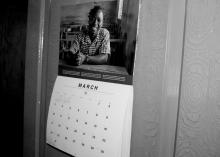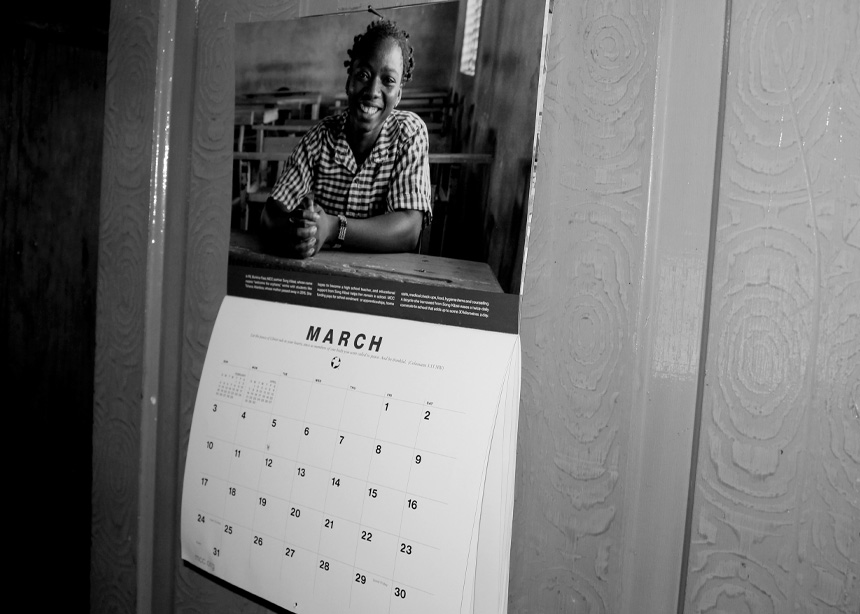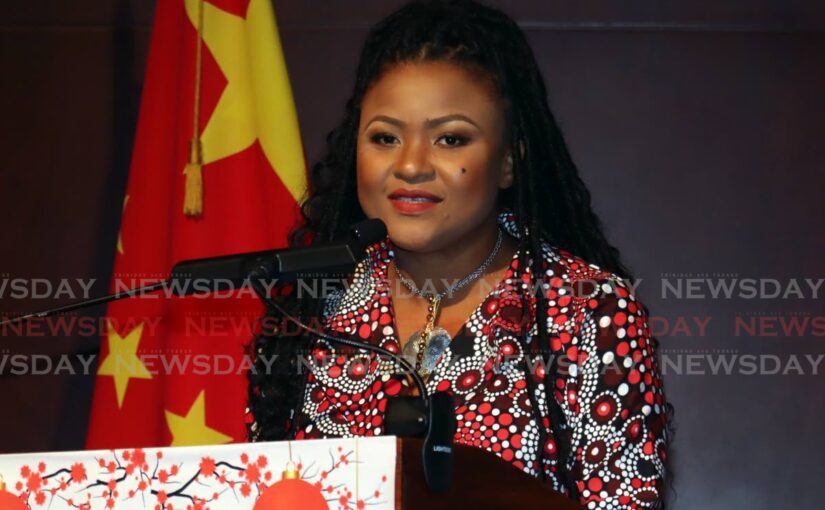“I still use it,” Anicka Fast says of the brownish knitted potholder she received at Mennonite Central Committee (MCC) orientation in Akron,...
Vous n'êtes pas connecté
- English
- Français
- عربي
- Español
- Deutsch
- Português
- русский язык
- Català
- Italiano
- Nederlands, Vlaams
- Norsk
- فارسی
- বাংলা
- اردو
- Azərbaycan dili
- Bahasa Indonesia
- Հայերեն
- Ελληνικά
- Bosanski jezik
- українська мова
- Íslenska
- Türkmen, Түркмен
- Türkçe
- Shqip
- Eesti keel
- magyar
- Қазақ тілі
- Kalaallisut ; kalaallit oqaasii
- Lietuvių kalba
- Latviešu valoda
- македонски јазик
- Монгол
- Bahasa Melayu ; بهاس ملايو
- ဗမာစာ
- Slovenščina
- тоҷикӣ ; toğikī ; تاجیکی
- ไทย
- O'zbek ; Ўзбек ; أۇزبېك
- Tiếng Việt
- ភាសាខ្មែរ
- རྫོང་ཁ
- Soomaaliga ; af Soomaali
 Maroc - CANADIANMENNONITE.ORG - A La Une - 28/Jun 19:22
Maroc - CANADIANMENNONITE.ORG - A La Une - 28/Jun 19:22
Involuntary: Behind the scenes
Our recent article, “Involuntary: Terminated MCC workers call for accountability and change” (posted online on June 20 and appearing in our July print issue), is a particularly sensitive and important piece. We believe some readers may value hearing how the story came about and how we make decisions about a story like that. How the story came about After contacting Canadian Mennonite (CM) editor Will Braun last October, Anicka Fast and John Clarke included Braun among the 22 people copied on a November 3, 2023, email to the boards of Mennonite Central Committee (MCC) Canada and U.S. This detailed email laid out the couple’s complaints. Braun followed up to obtain further information that would help CM decide whether to pursue the matter further, including asking MCC for information about their policies. Factors considered in deciding whether to proceed We do not report allegations just because they are brought to us. Journalists, unlike judges, do not determine who is guilty or innocent, but they do make determinations about which stories receive coverage and about the nature of that coverage. Factors considered in deciding whether to report on this case: There were numerous comparable accounts. We interviewed nine people who were terminated by MCC. Most interviews were lengthy. We also reviewed numerous documents related to the cases. In addition, we had one offrecord conversation with a tenth person who felt forced to accept a retirement package. We found a significant degree of thirdparty support for those raising concerns, particularly Anicka Fast and John Clarke. This is reflected in the article. Most of the people we interviewed expressed a desire to see constructive change come from their public efforts. This is not a criterion for reporting but it is relevant. We were shown documentary evidence of claims made. Most of the people interviewed have gone on to work for other respected Mennonite organizations. They are engaged and committed members of the broader Mennonite community. That is not a requirement for one’s story to be considered worthy of coverage, but it does say something about the credibility and character of the people raising concerns. Based largely on these factors, we decided to proceed. To look at the matter differently, if seven people reach out to Canadian Mennonite with serious concerns about a key Mennonite organization, we would need good reasons to exclude them. Still, their concerns must be vetted. Of note In 2023, CM spent considerable time investigating another situation of a former employee of a different Mennonite institution making serious accusations against their ex-employer. In that case, after numerous interviews, including with the institution in question, as well as various off-record conversations, CM chose not to report on the accusations. Corroboration was lacking and we had significant reason to doubt certain facts. It was a difficult decision. Checks and balances If a person makes an accusation that can harm the reputation of another person or organization, it is incumbent on a journalist or publication to exercise due diligence in trying to verify that accusation. The accused must also be given opportunity to reply. We have documentary evidence to support claims made in the article. We also offered MCC a few opportunities to reply. A (non-Mennonite) lawyer with decades of experience in media law (and employment law) reviewed two versions of the article line by line to advise on compliance with laws relevant to journalistic reporting. To be clear, this is NOT the same as a court process in which both sides would present their case in a much more rigorous way. Journalists are not required to verify information to that extent, as that would greatly stifle reasonable public airing of issues in the public interest. But there is a requirement to exercise due diligence in verifying facts. Unnamed sources Five of the nine former MCC workers we interviewed—including three who are behind the open letter to MCC constituents—have not put their names to their comments. In our reporting we have relied almost entirely on those who did provide their names. We have agreed not to use the names of the others due to possible consequences for their relationships and employment. While their input is not reflected directly in our reporting to a significant extent, our interviews with them inform our reporting. Balance and fairness The terminated workers provided much more information than MCC, so the amount of space given to the former workers is considerably greater than the space given to MCC. That said, we offer links to the two full statements offered by MCC and we have attempted to be fair in summarizing their responses in the article. Our conclusion Journalists do not determine guilt or innocence. But they do make numerous judgement calls with respect to what is reported and how. We do not tell readers what to think; we provide information that hopefully helps readers to make their own determinations of what to think. Different readers have come to different conclusions after reading “Involuntary,” as it should be. Our conclusion is that the story as reported is sufficiently credible and important to warrant reporting. The interest of readers is served by access to the information presented. Readers deserve to know, and the terminated workers deserve to be heard. Questions We imagine some readers may ask the following questions about our decision to publish the article. We are providing some responses to these questions, since they are part of our decision-making process. By publishing the article, is Canadian Mennonite suggesting that no one should donate to MCC or volunteer for MCC? We don’t tell people what do to with their time or money. We semi-regularly feature the work of MCC in Canadian Mennonite and we plan to continue. Haven’t we only heard one side of the story? While MCC was given numerous opportunities to respond, and did respond to some extent, they have not fully shared their story. Organizations are limited when commenting about specific personnel issues. We asked MCC to verify or comment on specific facts related to Anicka Fast and John Clarke. We also asked the board chairs to comment on the role of the board in such situations. They chose not to. If the case before the Quebec labour board proceeds, presumably more information from MCC will become public. Won’t publication of this article lead to decreased donations to MCC and thus decreased care for people who need it? We believe readers deserve to be aware of the concerns of the terminated workers. The good work of MCC does not, in our view, justify sidelining the concerns raised. Dealing openly with serious concerns should make an organization stronger, not weaker. What would be the effect if concerned former workers were silenced by the Mennonite press? Do prospective donors not benefit from more complete information? Are matters like these not best dealt with privately? Publicly airing dirty laundry is not helpful. It is not the Mennonite way. The people we spoke with have tried to address their concerns with staff at various levels, through established MCC procedures and with the boards of MCC Canada and U.S. One additional means of recourse is the broader community. Public accountability is one function of journalism. The people raising concerns are doing so out of a stated desire to strengthen MCC. The letter writers believe MCC supporters and donors deserve to know their story. In an organization the size of MCC, are there not bound to be some bad experiences? Readers can decide if this argument is an adequate response. Why target one organization? As mentioned above, last year we investigated allegations against another Mennonite organization. CM has reported on controversial terminations at Mennonite Church Canada in the past. The article may (or may not) cause other organizations to reflect on their practices. Issues related to HR dynamics and non-disclosure agreements are not unique to MCC. In the course of investigation for this article, we learned that a number of Mennonite organizations do not have set mechanisms in place for employees who have unresolved grievances with senior staff. This includes Canadian Mennonite. We are now working on that. While the article does shine a spotlight on MCC, we hope it occasions broader reflection as well. Feedback As always, Canadian Mennonite welcomes letters to the editors, story ideas and private feedback not intended for publication (which we always honour). letters@canadianmennonite.org editor@canadianmennonite.org publisher@canadianmennonite.org The 2024 MCC calendar. Photo by J. Burwalde Share this page:
Articles similaires
Statement from Mennonite Central Committee
The following statement was provided to Canadian Mennonite by Laura Kalmar, Director of Marketing and Communications, Mennonite Central Committee...
Seeking God in a 'thin place'
I grew up attending a relatively small Mennonite church—Foothills Mennonite in Calgary—with my family. My family was fairly involved in my church,...
Seeing beauty and injustice
Since her death in 1943, Simone Weil’s philosophy has impacted dozens of writers, thinkers and theologians. T.S. Eliot named her a saint. Simone de...
Respect our children’s rights
THE EDITOR: Open letter to principals, educators, parents and guardians. I write to you with a profound sense of urgency and concern regarding the...
How to decide how to vote – a psychologist’s advice
One of the things I often hear as an emotions researcher is that emotions should not “cloud” people’s decisions, that they get in the way, or...
Is social media making you unhappy? The answer is not so simple
You may have seen headlines that link social media to sadness and depression. Social media use goes up, happiness goes down. But recent studies...
Nationwide Strike: FG, ASUU Reach Truce
The Federal Government and the Academic Staff Union of Universities (ASUU) have ended their close-door meeting with a truce that all contentious...
Author imagines a way forward amid environmental upheaval
A new book offers practices for leaders and communities to foster healthier cultures during a time of ecological devastation. In Tending...
Slash National Assembly Members Jumbo Salaries, Cut Cost Of Governance, Pay Minimum Wage, Bishop Ezeokafor Urges Tinubu
‘Even N100, 000 is too small to Meet Basic Needs’ By Mmaduabuchi OnwumeluThe Catholic Bishop of Awka Diocese, His Lordship, Most...
Les derniers communiqués
-
Four Seasons to Expand Saudi Arabian Portfolio Alongside Dar Al Omran Company with New Hotel in Madinah
Four Seasons Hotels and Resorts - 07/05/2024
-
Four Seasons Yachts Unveils Inaugural Itineraries to the Caribbean and Mediterranean and a First Look at its 95 Spectacular Suites
Four Seasons Hotels and Resorts - 27/03/2024
-
Visual 01Elevating Excellence: Four Seasons Embarks on the Next Stage of Strategic Global Growth
Four Seasons Hotels and Resorts - 22/01/2024








%20(24).jpeg)

